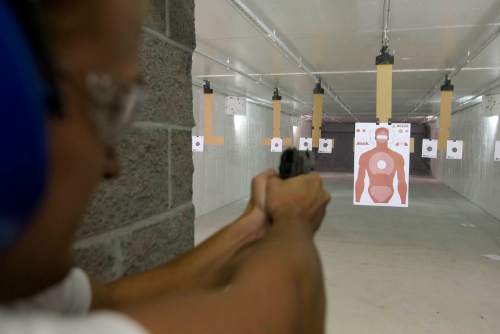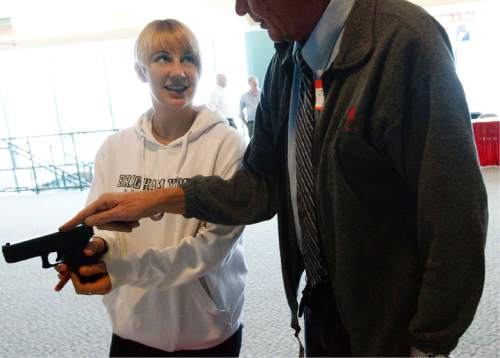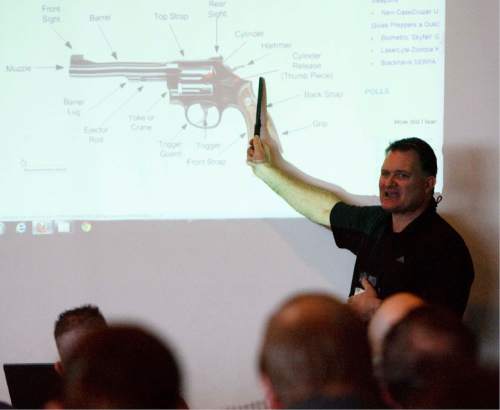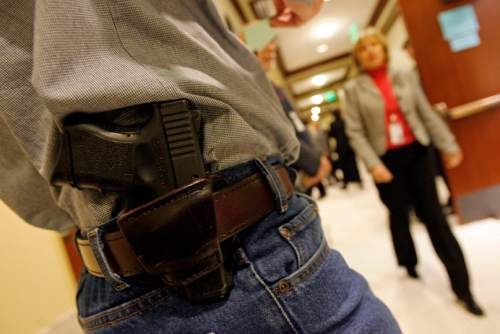This is an archived article that was published on sltrib.com in 2015, and information in the article may be outdated. It is provided only for personal research purposes and may not be reprinted.
Utah is on track to revoke a near-record number of concealed-weapons permits this year.
Through June, the state had revoked 399 weapons permits — more than the 12-month totals for each of the previous three years. And if the repeals continue at the current clip, 2015 will go down as having the second-highest number of revocations in state history. (2011 saw a record 1,046 revocations when a change in Utah law toughened requirements for nonresidents to obtain a permit, spurring a flurry of applicants to beat the deadline).
The sudden surge in cancellations this year doesn't mean that there's been a sudden outbreak of criminal activity among those licensed to pack guns. Rather, it's a problem of unreadable fingerprints.
"It's not necessarily that the person did anything bad if we're taking their permit away, we just couldn't complete background checks," said Jason Chapman, firearms supervisor with the Utah Bureau of Criminal Identification.
So far this year, 81 percent of the revocations — 323 of 399 — were for "insufficient fingerprints."
Prior to March, there was not a single revocation for bad fingerprints among the 612,000 Utah permit-holders, about two-thirds of them out of state.
A change in state law cleared the way for suspensions and revocations for unreadable fingerprints, Chapman said.
That puts it in alignment with FBI policy, which requires someone to reapply and pay a new processing fee after two fingerprint rejections.
Every applicant for a Utah concealed-carry permit is required to complete a firearms-safety course and submit fingerprints for a background check. Those prints then are forwarded to the FBI, which checks them and registers them as part of its nationwide database — the Integrated Automated Fingerprint Identification System. The database is used to match concealed-carry applicants with arrest records and block convicted felons and other criminals from obtaining permits and to identify evidence in criminal cases involving guns.
Under the old law, BCI said it could not revoke a permit for print issues. Instead, the agency would wait until a permit holder's license was up for renewal and then require a new set of prints.
Under the new rules, when people submit a concealed-carry permit application and their prints are deemed insufficient, they have 30 days to submit a new set. Anyone missing the deadline has his or her permit suspended; if that person doesn't provide a new set within a year, the permit is revoked.
—
Surging rejections • Results from the law change are just now showing up on BCI data sets because applicants have a year to get new prints before their temporarily-issued permit is revoked.
In March, the first time the new policy kicked in, BCI revoked 63 concealed-carry permits total, 60 of them for fingerprint problems.
The trend has continued every month since. In June, the most recent data available, 57 of 70 revocations were for prints.
The second biggest reason for revocations was alcohol violations, with 41 so far this year, followed by felony (charges or convictions), 16, and controlled- substance issues, four.
Suspensions are up too, because of the change in treatment of insufficient fingerprints.
From October 2011 through June, this issue accounted for 66 percent of all concealed-carry permit suspensions.
"The suspension is just temporarily taking their permit," Chapman said. "Where a revocation is a more permanent taking away of it."
Insufficient fingerprints can occur for a number of reasons, Chapman said, sometimes they are incorrectly taken by a firearms-safety instructor or applicant and, sometimes, a person's fingerprints simply have faded.
"People in certain professions, their fingerprints pretty much wear off and so they have a problem getting good prints," he said. "Also, as people just get older, their fingerprints get bad."
Jobs where people handle paper, or any rough material, can slowly erode skin on the hands, removing any texture including fingerprints.
—
Backlog • Clark Aposhian, the longest-serving member of BCI's concealed-carry board and a longtime gun lobbyist, said the revocation numbers are high because the agency's clerks are working to update backlogged records of people who never came back within a year for new fingerprints.
"We can clear these things off our books now," he said.
When a person's concealed-carry permit is revoked for insufficient fingerprints, they have to start the application process over again (unlike a felony conviction, which permanently bars a person from getting a permit).
If the person turns in two sets of fingerprints, and the FBI can't read either one, Chapman said there's a "backdoor" work-around. The applicant instead submits all personal identifiers, such as name, date of birth, Social Security number, height, weight – "everything that describes a person on their driver license" and more.
Aposhian supports these measures as an added "layer of inspection or verification."
"We go the extra step to make sure this permit and anyone holding it has gone through very consistent, very in-depth background checks," he said.
Miriam Walkingshaw, president of Utah Parents Against Gun Violence and a gun-control advocate, applauds the fingerprint database as a high point in what she feels is an otherwise lax process for obtaining a Utah concealed-gun license.
"Utah law, in general, when it comes to concealed-carry permits, is already pretty weak," she said. "[So if someone wants to] carry a loaded weapon in public, we should have a record of their fingerprints."
The FBI now uses digital scans of the fingerprint cards, what Chapman calls an effort to be "more efficient and cheaper." This new system will likely speed up the application process on that end, he said.
The Salt Lake Tribune contacted the Salt Lake City division of the FBI and the Criminal Justice Information Center (the largest data division of the FBI) for more information on the process, but was unable to reach anyone with knowledge of the recent changes.
Twitter: @CourtneyLTanner —
Concealed-carry permit revocations
399 for first six months of 2015:
323 insufficient fingerprints
41 alcohol violations
16 felony convictions
5 adjudicated mentally incompetent
4 controlled substance
3 moral turpitude
2 domestic violence
2 protective order
2 threat to self or other
1 firearm offense
Source: Utah Bureau of Criminal Identification









